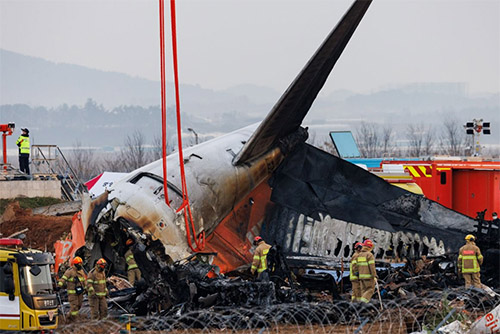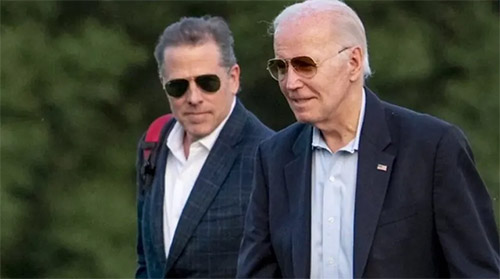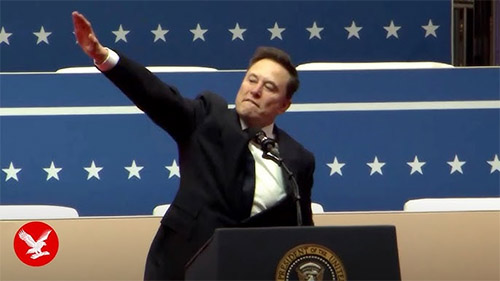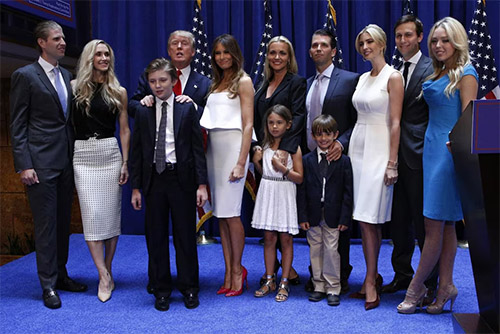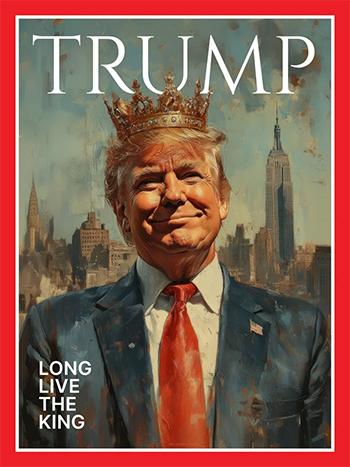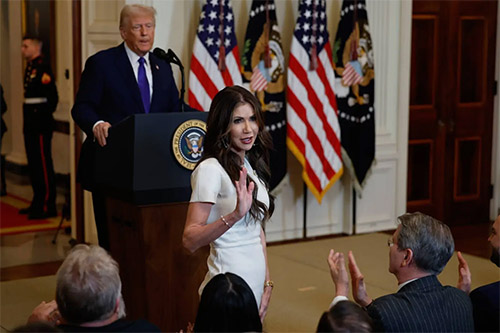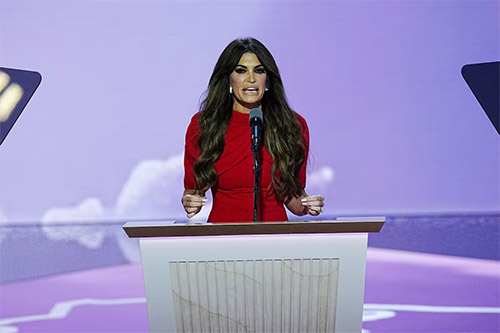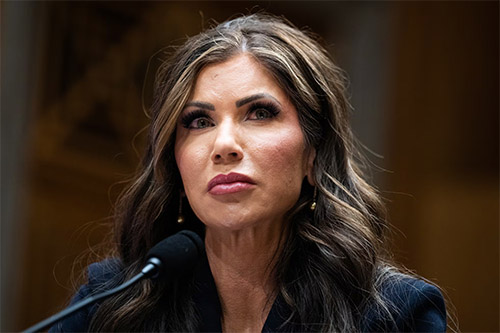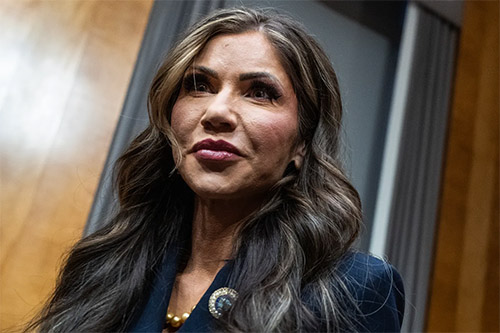by Brendan Pierson and John Kruzel
Reuters
February 27, 2025 12:21 PM MST Updated an hour ago
https://www.reuters.com/legal/trump-adm ... 025-02-26/
https://www.courtlistener.com/docket/69628254/global-health-council-v-donald-j-trump/
Summary
• Plaintiffs say Trump actions violate US law, Constitution
• Administration had asked US Supreme Court to intervene
WASHINGTON, Feb 26 (Reuters) - U.S. Supreme Court Chief Justice John Roberts on Wednesday paused a federal judge's order requiring President Donald Trump's administration to pay foreign aid funds to contractors and grant recipients.
Roberts issued an interim order placing on hold Washington-based U.S. District Judge Amir Ali's action that had imposed a deadline of 11:59 p.m. on Wednesday night. Roberts provided no rationale for the order, known as an administrative stay, which will give the court additional time to consider the administration's more formal request to block Ali's ruling.
Roberts asked for a response from the plaintiffs -- organizations that contract with or receive grants from the U.S. Agency for International Development and the State Department -- by noon on Friday.
The order came after Trump's administration said in a court filing on Wednesday it had made final decisions terminating most U.S. foreign aid contracts and grants, while maintaining that it cannot meet Ali's court-ordered deadline.
Without explanation or substantiation, “operational and administrative reasons” for lengthy delays in restoring funding is incredible, particularly given the speed and efficiency with which hundreds of funding streams were frozen in the immediate wake of the OMB Directive. When OMB issued the Directive in the evening on January 27, 2025, it required the temporary pause to “become effective on January 28, 2025, at 5:00 PM.” Compl. Ex. A. Contemporaneous reporting and Plaintiffs’ evidence demonstrate that funding shutoffs began almost immediately after the OMB Directive issued. It is inexplicable why the federal government, which apparently determined it feasible to pause almost all federal funding within 24 hours, has not universally restored access to funds after nearly a week. As explained in the Plaintiff States’ Motion for Preliminary Injunction 34, even a momentary delay in the intricate accounting dance that underpins our cooperative federal system can result in failures to make payroll and the potential shuttering of programs and nonprofit entities that provide vital health and human services to the residents of the Plaintiff States.
-- Request for Emergency Relief to Enforce Temporary Restraining Order of January 31, 2025 Upon Evidence of Violation; Plaintiff States' Motion for Enforcement of the Temporary Restraining Order, USDC Rhode Island, State of New York, et al., v. Donald Trump, et al., Case No. 1:25-cv-00039
The administration is cutting more than 90% of the U.S. Agency for International Development's foreign aid contracts and over $58 billion in overall U.S. assistance around the world, a State Department spokesperson said separately, calling the cuts part of Trump's "America First agenda."
The foreign aid funding dispute arose from a pair of lawsuits brought by the aid organizations, alleging that the agencies have illegally frozen all foreign aid payments.
The Trump administration has kept those payments largely frozen despite a February 13 temporary restraining order from Ali that they be released, and multiple subsequent orders that the administration comply, culminating in the Wednesday night deadline.
Lawyers for the U.S. Justice Department have maintained that the administration has a right to suspend its agreements while it reviews them to determine whether they comply with administration policy.
That review is now complete, the administration said in its new filing. It said USAID has made final decisions to cancel nearly 5,800 awards, while keeping more than 500, and that the State Department has canceled about 4,100 awards, while keeping about 2,700.
An administration official said in an earlier court filing that grounds for terminating contracts include that they were related to diversity, equity, inclusion and accessibility efforts, or were deemed wasteful.
Trump has taken a hard line on programs related to diversity, equity and inclusion, signing an executive order in his second day in office last month directing federal agency chiefs to dismantle DEI policies.
The administration said on Wednesday that Secretary of State Marco Rubio had ordered that past-due invoices from the plaintiffs for work before January 24, when the payment freeze began, to be "expedited for payment without the ordinary vetting procedures, in a good-faith effort to comply" with Ali's order. It said that while some money would be paid on Wednesday, full payments could take weeks.
FUNDING FREEZE UNDERMINES RELIEF EFFORTS
Trump, a Republican, ordered a 90-day pause on all foreign aid on his first day in office last month. That order, and ensuing stop-work orders halting USAID operations around the world, have jeopardized the delivery of life-saving food and medical aid, throwing global humanitarian relief efforts into chaos.
USAID administers some 60% of U.S. foreign assistance and disbursed $43.79 billion in fiscal 2023. According to a Congressional Research Service report this month, its workforce of 10,000, of which about two-thirds serves overseas, assisted about 130 countries.
Trump's administration on Sunday said it was placing all but leaders and critical staff at USAID on paid administrative leave and eliminating 1,600 positions. Employee unions have sued to challenge the cuts, though a judge last week allowed them to go ahead.
Ali, who was appointed by Trump's Democratic predecessor, former President Joe Biden, issued his temporary restraining order to prevent irreparable harm to the plaintiffs while he considers their claims.
The plaintiffs allege Trump has exceeded his authority under federal law and the U.S. Constitution by effectively dismantling an independent agency and canceling spending authorized by Congress.
The plaintiffs have said the administration has not done anything to comply with the restraining order, and some have said they will shut down within days if they are not paid.
"The lengths that the government is willing to go to flout a court order, all for the goal of ending life-saving humanitarian assistance, is staggering," said Allison Zieve, a lawyer representing two plaintiffs, AIDS Vaccine Advocacy Coalition and Journalism Development Network, on Wednesday.
Other plaintiffs include international development company DAI Global and refugee assistance organization HIAS.
Both Ali and a Rhode Island federal judge [John J. McConnell, Jr.] in a separate case over a broader federal payment freeze have castigated the Trump administration for failing to follow their orders. The administration in both cases has maintained it is trying in good faith to interpret and comply with the orders.
***********************************
https://www.courtlistener.com/docket/69 ... d-j-trump/
Feb 25, 2025: Minute Entry and Order for proceedings held via Zoom before Judge Amir H. Ali: Motion Hearing held on 2/25/2025 re 36 Emergency MOTION to Enforce Temporary Restraining Order filed by GLOBAL HEALTH COUNCIL, DAI GLOBAL LLC, DEMOCRACY INTERNATIONAL, INC., AMERICAN BAR ASSOCIATION, SMALL BUSINESS ASSOCIATION FOR INTERNATIONAL COMPANIES, CHEMONICS INTERNATIONAL, INC., MANAGEMENT SCIENCES FOR HEALTH, INC., HIAS. Oral arguments HEARD, motion GRANTED for the reasons stated on the record. The restrained defendants are ordered to comply as discussed by 11:59 p.m. on February 26, 2025. (Court Reporter Bryan Wayne) (znbn)
****************
GLOBAL HEALTH COUNCIL v. DONALD J. TRUMP (1:25-cv-00402) District Court, District of Columbia https://www.courtlistener.com/docket/69 ... d-j-trump/
UNITED STATES DISTRICT COURT
FOR THE DISTRICT OF COLUMBIA
AIDS VACCINE ADVOCACY COALITION, et al.,
Plaintiffs,
v.
UNITED STATES DEPARTMENT OF STATE, et al.,
Defendants.
______________________________________
GLOBAL HEALTH COUNCIL, et al.,
Plaintiffs,
v.
DONALD J. TRUMP, et al.,
Defendants.
Civil Action No. 25-00402 (AHA)
Order Denying Motion To Stay Pending Appeal
On February 13, 2025, this Court granted a temporary restraining order (“TRO”), finding Plaintiffs had shown that Defendants’ blanket suspension of congressionally appropriated foreign aid funds would cause them irreparable harm and was likely arbitrary and capricious under the Administrative Procedure Act (“APA”) for failing to consider the immense reliance interests at stake. Glob. Health, ECF No. 21; AIDS Vaccine, ECF No. 17. While the Court did not grant Plaintiffs the full scope of emergency relief they sought, it enjoined Defendants from continuing a blanket freeze of the congressionally appropriated funds. Over the nearly two weeks since, Plaintiffs have moved multiple times to enforce the Court’s TRO and hold Defendants in contempt, each time attaching evidence that Defendants have continued their funding freeze and evidence of the irreparable harm to businesses and organizations across the country that justified the TRO. In response to those motions, the Court declined to hold Defendants in contempt and reaffirmed certain flexibility and authority Defendants reserved, consistent with the TRO. AIDS Vaccine, ECF No. 30; AIDS Vaccine, Feb. 25, 2025, Min. Entry; see also AIDS Vaccine, ECF No. 34 (addressing Defendants’ motion for clarification). However, the Court twice reiterated in its orders: “[T]o the extent Defendants have continued the blanket suspension, they are ordered to immediately cease it and to take all necessary steps to honor the terms of contracts, grants, cooperative agreements, loans, and other federal foreign assistance awards that were in existence as of January 19, 2025, including but not limited to disbursing all funds payable under those terms.” AIDS Vaccine, ECF No. 34 at 5; AIDS Vaccine, ECF No. 30 at 5. The Court’s TRO and these subsequent orders remain in effect and unchallenged. Neither Defendants’ recent notice of appeal nor the instant motion to stay pending appeal challenges the terms of the TRO or these prior orders.
Defendants have filed the instant motion to stay the Court’s order granting Plaintiffs’ latest motions to enforce the TRO. In those motions, Plaintiffs again provided evidence that Defendants have simply continued their blanket funding freeze and further documentation of the irreparable harm they are suffering, including attestations of severe harm that will manifest before the end of the week. Plaintiffs explained that they tailored their motion to enforce to address only the most acute irreparable harm, seeking compliance with the TRO by unfreezing the congressionally appropriated funds at least for all work completed prior to February 13, the date of the Court’s TRO. Upon receiving the motion, and now twelve days since the TRO had been granted, the Court held a prompt hearing to hear from all parties in both cases on the state of compliance. At the hearing, counsel for Defendants acknowledged that the Court’s TRO foreclosed Defendants from giving any effect to suspensions or terminations that were issued before February 13. AIDS Vaccine, ECF No. 35 at 33–34. The Court asked counsel for Defendants if he was “aware of steps taken to actually release those funds,” consistent with the TRO and subsequent orders. Id. at 35. Counsel responded that he was “not in a position to answer that.” Id. For this and additional reasons stated on the record, the Court orally granted Plaintiffs’ second round of motions to enforce the TRO. The Court ordered Defendants to unfreeze funds for work completed prior to February 13, consistent with the terms of the TRO and the Court’s subsequent orders, giving Defendants an additional 36 hours to do so. The Court made clear that, although it was focusing on this specific aspect of the TRO that was the subject of Plaintiffs’ motion to enforce and which was a consequence of the TRO’s injunctive relief, the Court was “in no way limiting the scope of the TRO or modifying its terms.” Id. at 55–56. The Court further ordered the parties to provide a joint status report the next day, updating the Court on the circumstances and providing documentation necessary for the parties and Court to assess the state of compliance.
Defendants’ principal basis for staying the Court’s ruling pending appeal appears to be that they can only partially unfreeze funds within the additional 36 hours that the Court gave them, and that they need more time to unfreeze the funds at issue in Plaintiffs’ latest motion to enforce. See AIDS Vaccine, ECF No. 37 at 2–3 (stating it is “not possible for Defendants to comply” within 36 hours). This is not something that Defendants have previously raised in this Court, whether at the hearing or any time before filing their notice of appeal and seeking a stay pending appeal. That is so even though Plaintiffs’ motion to enforce explicitly proposed compliance on this time frame. If Defendants wanted to propose a different schedule for achieving compliance, that is something they could have proposed to this Court and that the Court could have considered alongside Plaintiffs’ showings. Any such schedule would have to take into account that Defendants have already had nearly two weeks to come into compliance, apparently without taking any meaningful steps to unfreeze funds. Moreover, particularly given Defendants’ delay and the imminent harm Plaintiffs have documented, it would require far greater specificity than has been provided in the motion to stay pending appeal, including significant, concrete steps in the immediate term toward reaching compliance. This is not nearly grounds for a stay pending appeal—to the contrary, a stay would directly contradict that purpose.
Defendants’ remaining arguments in the motion for stay pending appeal demonstrate the shifting ground at this early stage and simply highlight the need for expeditious resolution of the preliminary injunction motions in these cases, which the Court has agreed to consider on the parties’ proposed briefing schedule. Defendants state, for instance, that injunctive relief here “intrudes deeply into the prerogatives of the Executive Branch and the discretion committed to the President under Article II,” asserting that “Executive Branch leadership harbors concerns about the possibility of waste and fraud and is in the process of developing revised payment processing systems to address those concerns.” AIDS Vaccine, ECF No. 37 at 4. But the blanket suspension of congressionally appropriated funding that has been challenged and temporarily enjoined was the result of a categorical order, not any specific finding “about the possibility of waste and fraud.” Indeed, in defending the challenged action at the Court’s TRO hearing, Defendants did not even attempt to argue that the agency action was or could be justified based on waste or fraud. And, to date, Defendants have not adduced any evidence “about the possibility of waste and fraud” beyond conclusory statements like the one in their motion.
Moreover, although Defendants’ motion to stay refers to “the prerogatives of the Executive Branch and the discretion committed to the President under Article II,” it does so without offering meaningful depth to analyze the argument, including not identifying the particular constitutional prerogatives they rely on. For instance, Defendants do not explain how the described prerogatives bear on likely violation of the APA, the statutory authority on which the TRO was based and whose constitutional validity has not been challenged. As written, the argument seems to simply presume that Defendants will prevail on the separation of powers questions that Plaintiffs have raised, without nearly enough analytical depth. See, e.g., Zivotofsky ex rel. Zivotofsky v. Kerry, 576 U.S. 1, 21 (2015) (“The Executive is not free from the ordinary controls and checks of Congress merely because foreign affairs are at issue.”); id. at 62 (Roberts, C.J., dissenting) (recognizing that “[t]he Constitution allocates some foreign policy powers to the Executive, grants some to the Legislature, and enjoins the President to ‘take Care that the Laws be faithfully executed’”).
Defendants’ arguments that injunctive relief under the APA runs into a sovereign immunity problem given the monetary consequences, and that remedies may be available under the Contract Disputes Act or the Tucker Act, are similarly undeveloped and an attempt to pretermit the preliminary injunction stage. Defendants state that the Court has “refus[ed] to consider its own jurisdiction” before entering its TRO. That is not so. At the hearing on Plaintiffs’ motion to enforce, the Court simply noted that the purpose of the hearing was to understand Defendants’ compliance, not to relitigate the TRO. See AIDS Vaccine, ECF No. 35 at 47 (explaining that “this is not an opportunity to relitigate the TRO. The TRO is in effect, it hasn’t been stayed or overturned in any sort of way. I do want to make that clear.”). However, the Court has considered its jurisdiction at each stage of this case. Defendants’ undeveloped arguments on this point to date have not persuaded the Court that they would affect the Court’s prior likelihood of success analysis as it relates to the TRO. For example, Defendants’ instant motion does not meaningfully engage with the large body of precedent on this question. See, e.g., Kidwell v. Dep’t of Army, 56 F.3d 279, 285 (D.C. Cir. 1995) (reviewing this body of case law and recognizing that although “a victory for the plaintiffs may well have required the government to pay them money, the Tucker Act was not implicated” because monetary benefits would not come “from the district court’s exercise of jurisdiction but from the structure of” statutory and regulatory requirements); Am.’s Cmty. Bankers v. FDIC, 200 F.3d 822, 829 (D.C. Cir. 2000) (“Not all forms of monetary relief are money damages.”); Robles v. Kerry, 74 F. Supp. 3d 254, 260 (D.D.C. 2014) (noting that APA waives sovereign immunity for claims seeking “relief other than money damages” but that money damages “are categorically exclusive of specific relief—which includes monetary relief sought as a statutory entitlement”). Parties regularly raise jurisdictional arguments at the TRO phase—or, like here, well after a TRO has been granted—and the conclusion that such arguments do not alter the Court’s analysis is not a basis for staying the TRO pending appeal.
To be sure, the parties requested a briefing schedule to develop these arguments for the preliminary injunction phase, which the Court has adopted and is still in progress. Under that schedule, Defendants recently filed their preliminary injunction brief, and the Court shortened Plaintiffs’ deadline to reply to noon tomorrow, in the interest of proceeding as expeditiously as possible. The Court is prepared to hold a hearing on the preliminary injunction motions in both cases by March 4, 2025, and issue an opinion considering the full record and arguments before it with full dispatch. The Court has set the expiration date for the TRO at 11:59 p.m. on March 10, 2025, or the date the Court resolves the preliminary injunction motions, whichever is sooner.
The purpose of temporary emergency relief was to restore the status quo as it existed before Defendants’ blanket suspension of congressionally appropriated funds, given Plaintiffs’ strong showing of irreparable harm and that Defendants’ blanket suspension of funds was likely arbitrary and capricious. A stay pending appeal would run directly contrary to that purpose and, indeed, would have the opposite effect of rendering the Court’s TRO—unchallenged in the appeal or stay motion—a nullity. The Court accordingly denies Defendants’ motion for a stay pending appeal.
SO ORDERED.
AMIR H. ALI
United States District Judge
Date: February 26, 2025
**********************************
Three Trump Court Losses Within 90 minutes, But A (Temporary) Save By The Supreme Court
Glenn Kirschner
Feb 27, 2025
Three federal judges ruled against Trump and his administration's positions, including telling Trump that the federal government can't just stop paying on contracts it entered into to provide certain US aid overseas.
Just when we thought Trump would be required to act lawfully, in steps Supreme Court Chief Justice John Roberts and pauses the lower court ruling requiring the Trump administration to release the funds and make good on the federal government's financial obligations.
Which raises the question: who will ever trust the United States government in the future?
Transcript
So friends, in the span of just 90
minutes, Donald Trump and his
administration lost three federal court
cases, but in one of those cases, Chief
Justice John Roberts came sprinting to
the aid of Donald Trump and his
lawlessness. Let's talk about that
because Justice matters.
[Music]
hey all Glenn Kirschner here so friends
let's start with some good news on the
legal front Donald Trump and his
administration is getting crushed in
case after case after
case let's start with the new reporting
this from from
CNN:
For Trump, 3 court losses in 90 minutes
by Devan Cole
CNN
Updated 5:20 PM EST, Tue February 25, 2025
https://www.cnn.com/2025/02/25/politics ... index.html
Three different federal judges delivered legal setbacks and slap downs to President Donald Trump in the span of an hour and a half on Tuesday in a series of cases challenging controversial moves taken during the early days of his second term.
The rulings from judges in Washington, DC, and Washington state are the latest to pump the brakes on Trump’s agenda, underscoring the critical role courts have taken on for foes of Trump looking to frustrate his actions.
In DC, Judge Loren AliKhan issued a preliminary injunction that indefinitely blocks the administration from freezing federal grants and loans. The ruling expands an earlier block the appointee of former President Joe Biden issued last month shortly after the White House ordered the funding freeze.
“In the simplest terms, the freeze was ill-conceived from the beginning. Defendants either wanted to pause up to $3 trillion in federal spending practically overnight, or they expected each federal agency to review every single one of its grants, loans, and funds for compliance in less than twenty-four hours. The breadth of that command is almost unfathomable,” AliKhan wrote in her ruling.
She went on to say that the spending freeze was “irrational, imprudent, and precipitated a nationwide crisis.”
The issue of withholding federal funds has become a major flashpoint during the opening weeks of Trump’s second term, with other pending cases challenging the White House’s decision to suspend all foreign assistance.
Shortly before AliKhan issued her ruling, a separate jurist in the DC federal courthouse – Judge Amir Ali – ordered the Trump administration to pay foreign aid-related money owed to government contractors and nonprofit groups by Wednesday night, amid the legal fight over the freezing of USAID and State Department funds.
That order amounted to a legal reprimand after the plaintiffs in the cases repeatedly accused the administration of not complying with Ali’s earlier temporary restraining order that revived the funding contracts and grants that existed at the end of the Biden administration.
Ali – also a Biden appointee – rebuffed an earlier call by the challengers for the administration to be held in contempt for its alleged non-compliance. But he issued a new order requiring, in more forceful terms, that the government pay money owed to contractors and non-profits for work that had already been completed by the February 13 order.
Meanwhile, across the country in Washington state, a federal judge in Seattle issued a preliminary injunction on Tuesday that halts Trump’s executive order suspending refugee admissions and funding.
Judge Jamal Whitehead, who was also appointed by Biden, said that Trump’s “actions amount to an effective nullification of congressional will in establishing the nation’s refugee admissions program.”
“While the president has substantial discretion to suspend refugee admissions, that authority is not limitless,” the judge said.
Trump’s executive order, signed on his first day back in office, also directed a review of the refugee program and stated that resettlement should only resume if deemed to be in the “national interest” – a move critics argue is a de facto refugee ban.
Cases advance to next stages
The administration is facing at least 80 cases challenging a range of actions taken during Trump’s first few weeks back in office.
The plaintiffs behind those challenges have seen some success as they’ve pressed judges to issue emergency relief during the early stages of the litigation. But the White House, too, has scored some court victories in cases brought against the administration’s efforts to shrink the federal workforce and shutter the US’ foreign aid agency.
Many of the cases are finally getting a more thorough review by judges who are mulling whether to issue preliminary injunctions to block the contested government action. Such a decision is often the final trial court-level ruling issued in cases before they’re appealed by the losing side.
As AliKhan explained her reasoning for issuing the preliminary injunction in the funding freeze case, she said the nonprofits that brought the case were likely to succeed on their claims that the freeze was unlawful.
“The scope of power (the Office of Management and Budget) seeks to claim is ‘breathtaking,’ and its ramifications are massive,” she wrote. “Because there is no clear statutory hook for this broad assertion of power, Plaintiffs are likely to succeed on the merits of this claim.”
And AliKhan noted that her earlier order temporarily halting the funding freeze was just that – temporary.
“The relief Plaintiffs now seek is a more durable version of the relief they sought then, when their members were on the brink of extinction,” she wrote. “In sum, Plaintiffs have marshalled significant evidence indicating that the funding freeze would be economically catastrophic – and in some circumstances, fatal – to their members.”
CNN’s Tierney Sneed and Angelica Franganillo Diaz contributed to this report.
Headline for Trump three court
losses in 90
minutes and that article begins three
different federal judges delivered legal
setbacks and slapd downs to president
Donald Trump in the span of an hour and
a half on Tuesday in a series of cases
challenging controversial moves taken
during the early days of his second term
the rulings from judges in Washington DC
and Washington state are the latest to
pump the brakes on Trump's agenda
underscoring the critical role courts
have taken on for foes of trump looking
to frustrate his
actions you know friends I would phrase
that a little differently I would say it
underscores the critical role courts
have taken on to prevent Trump
lawlessness my editorial Edition
the article continues in DC judge Lauren
alian issued a preliminary injunction
that indefinitely blocks the
administration from freezing federal
grants and Loans the ruling expands on
an earlier block the appointee of former
President Joe Biden issued last month
shortly after the White House ordered
the funding freeze quote in the simplest
terms the freeze was Ill conceived from
the beginning
defendants either wanted to pause up to
$3 trillion in federal spending
practically overnight or they expected
each Federal agency to review every
single one of its grants loans and funds
for compliance in less than 24 hours the
breadth of that command is almost
unfathomable judge Ali KH con wrote in
her
ruling she went on to say that the
spending freeze was irrational imprudent
and precipitated a nationwide crisis
shortly before Ali Khan issued her
ruling a separate jurist in the DC
federal courthouse judge Amir Ali
ordered the Trump Administration to pay
foreign aid related money owed to
government contractors and nonprofit
groups by Wednesday night amid the legal
fight over the freezing of us AI ID and
state department funds that order
amounted to a legal reprimand after the
plaintiffs in the cases repeatedly
accused the Trump administration of not
complying with Ali's earlier temporary
restraining order that revived the
funding contracts and grants that
existed at the end of the Biden
Administration meanwhile across the
country in Washington state a federal
judge in Seattle issued a preliminary
injunction on Tuesday that halts Trump's
executive order suspending Refugee
Admissions and
funding judge Jamal Whitehead who was
also appointed by Biden said that
Trump's actions amount to an effective
nullification of congressional will in
establishing the nation's Refugee
admissions program quote while the
president has substantial discretion to
suspend Refugee admissions that
Authority is not Limitless the judge
said and friends just as quick as
federal court judges essentially ordered
the Trump Administration to comply with
its damn contractual obligations pay the
money you owe to
contractors and the judges didn't put it
in exactly those terms those are my
words but in substance they told the
Trump Administration
just act
lawfully just you know abide by the
contracts you entered into just as soon
as they issued those orders well the
Supreme Court Chief Justice John Roberts
came in and said no no no not so fast
we're going to go ahead and pause all
that and let the Trump
Administration you know default on these
contracts violate the terms of the
agreements they entered into with these
contractors you know a little bit of
lawlessness by Trump and his
administration is just fine by Supreme
Court Justice John
Roberts here's the new reporting on that
from
HuffPost headline Supreme Court for now
won't require Trump Administration to
release billions in foreign aid the
Supreme Court has temporarily blocked
the judge's order giving the Trump
Administration a midnight deadline to
release billions of dollars in US
foreign
aid and that article
Begins the Trump Administration said
Wednesday it is eliminating more than
90% of the US agency for International
development's foreign aid contracts and
$60 billion in overall us assistance
around the world putting numbers on its
plans to eliminate the majority of us
development and humanitarian help
abroad the cuts detailed by the
administration would leave few surviving
us Aid projects for Advocates to try to
save in what are ongoing Court battles
with the
administration the Trump Administration
outlined its plans in both an internal
memo obtained by the Associated Press
and filings in one of those fed Federal
lawsuits
Wednesday the Supreme Court intervened
in that case late Wednesday and
temporarily blocked a court order
requiring the administration to release
billions of dollars in foreign aid by
midnight Wednesday's disclosures also
give an idea of the scale of the
administration's Retreat from us Aid and
development assistance overseas and from
Decades of us policy that foreign aid
helps us interests by stabilizing other
countries and economies and building
alliances in the federal court filings
Wednesday nonprofits owed money on
contracts with us Aid described both
Trump political appointees and members
of musk's Team terminating us AIDS
contracts around the world at break next
speed
without time for any meaningful review
they
say the nonprofits among thousands of
contractors owed billions of dollars in
payment since the freeze began called
the unmas contract terminations a
maneuver to get around complying with
the order to lift the funding freeze
temporarily so did a democratic lawmaker
quote the administration is brazenly
attempting to blow through Congress and
the courts by announcing the completion
of their sham review of foreign aid and
the immediate termination of thousands
of Aid programs all over the world said
Connecticut Senator Chris Murphy a
member of the Senate Foreign Relations
Committee but US District Judge Amir
Ali's order to unfreeze billions of
dollars by midnight Wednesday will
remain on hold until the Supreme
court has a chance to weigh in more
fully according to the brief order
signed by Chief Justice John
Roberts that's right friends the US
government made commitments to
contractors around the world to provide
certain funding and now Donald Trump
swoops in and just says yeah we're just
going to default on all of those
contracts just pull the carpet right out
from under underneath all of those
people and organizations to whom we made
commitments kind of sounds like the way
Donald Trump did business as a
businessman right stiffing his
contractors left and
right but ordinarily the courts could
step in and hold Donald Trump
accountable to the contracts he
entered but the US Supreme Court
now Chief Justice John Roberts said
we're just going to go ahead and endure
and indorse at least
temporarily Donald Trump's
lawlessness his refusal to comply with
contracts the United States entered you
know friends Donald Trump is not only
making us the laughing stock of the
world he is
damaging the varability of the United
States to do business around the globe
who in the hell is going to trust the
word of the Executive Branch the federal
government when not only is Donald Trump
willing to for no damn good reason
default on our promises and contractual
obligations but when he's got a handful
of Supreme Court Justices who are
willing to put their stamp of approval
on Donald Trump's
defaults his
corruption his
lawlessness this is not sustainable for
the United States of
America and it's up to us and our
elected officials to do everything we
can to make sure this does not long
stand because
Justice
matters friends as always please stay
safe please stay tuned and I look
forward to talking with you all again
tomorrow
[Music]
*******************************
Supreme Court of the United States
No. 24A831
DEPARTMENT OF STATE, ET AL.
Applicants
v.
AIDS VACCINE ADVOCACY COALITION, ET AL.
ORDER
UPON CONSIDERATION of the application of counsel for the applicants,
IT IS ORDERED that the February 25, 2025 orders of the United States District Court for the District of Columbia, case Nos. 1:25-cv-00400 and 1:25-cv-00402, are hereby stayed pending further order of the undersigned or of the Court. It is further ordered that any response to the application be filed on or before Friday, February 28, 2025, by 12 p.m. (EST).
/s/ John G. Roberts, Jr.
Chief Justice of the United States
Dated this 26th day of February, 2025.

